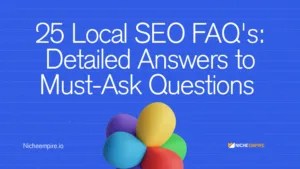Imagine you’ve got the coolest sneakers, the trendiest clothes, or the tastiest treats for sale. But no one knows about your amazing products. It’s like having a treasure chest buried deep underground, right? Correct.
If you have an e-commerce store or a brick-and-mortar store with an online presence, you need to find a way to drive potential customers to your store so you can make sales. That is where Search Engine Optimization (SEO) comes in, and this guide will show you how to use it for your online business.
Before we get into the benefits of e-commerce SEO, you should understand what it is and why it should form an essential part of your SEO strategy.
What is E-commerce SEO?
E-commerce SEO optimizes your e-commerce site to improve its visibility in search engine results. It is different from traditional SEO because it focuses on driving potential buyers to your online store. It targets keywords that online shoppers frequently use when searching for products or services.
A BrightEdge report shows that SEO generates 1000% more traffic than social media, demonstrating the importance of SEO for ecommerce businesses. E-commerce SEO helps your online store become more visible to potential customers searching for what you offer. Therefore, if you want to improve the sales of your online products, SEO should be a major part of your marketing.
Why is SEO Important for your Online Store?
SEO is essential because a well-optimized e-commerce website ranks higher in search results, attracts more qualified traffic, and increases sales.
Optimizing your e-commerce website is crucial for your online store because it helps you be seen. When people search for products related to your store, SEO ensures your website appears in the search engine results, especially on the first page. This is important because 92% of search traffic goes to the first page of search results, according to Chitika Insights.
Now that we’ve learned what e-commerce SEO is and why you should add it to your online business strategy let’s go ahead and see the top ten benefits of implementing e-commerce SEO for your online store.
Top 10 Benefits of E-commerce SEO
1. Ecommerce SEO Increases Organic Traffic
One of the primary benefits of e-commerce SEO is its ability to attract organic or unpaid traffic to your website. This means more people will find your store without you having to pay for advertising. When researching products to buy, these visitors will find your site through the search engine results page.
Unlike paid ads offering short-term visibility, organic traffic provides sustained growth. When you target relevant keywords, optimize your product pages, and provide optimized SEO product descriptions, your e-commerce store will consistently attract visitors searching for your products and services. This approach ensures that your traffic is high and highly relevant, leading to more sales.
2. It Improves Your Ecommerce Business Visibility
When your e-commerce website ranks higher in search results, your brand becomes more visible to a broader audience. This can help establish your brand as a trusted and reputable source for your products. Ranking high for specific relevant keywords can establish your brand as an authority in your industry.
Getting you to the top of search results is what e-commerce SEO does for your online store. This will ensure your business is available when potential customers search for you. It will also help you build trust and credibility with your audience.
3. Higher Conversion Rates in the Ecommerce Industry
Driving traffic to your site is only half the battle; converting visitors into customers is the ultimate goal. SEO can help you attract highly targeted traffic, meaning people actively searching for what you offer. This can lead to higher conversion rates, as these visitors are more likely to purchase.
Ecommerce SEO helps you find and use the keywords that your customers search on Google, ensuring that they find your online store when they search. Your Ecommerce SEO strategy will optimize your product descriptions, implement compelling calls to action, and create a streamlined checkout process that leads to more conversions.
A Search Engine Journal survey reveals that 49% of marketers cite organic search as providing the highest ROI. E-commerce SEO can help increase your conversion rate, ensuring traffic translates into tangible revenue. This makes it an invaluable tool for your online business.
4. Cost-Effective Marketing
While SEO requires time and effort, it’s a cost-effective marketing strategy compared to paid advertising. Once you’ve optimized your website, you can continue to reap the benefits for a long time. Using ads costs more money because you will spend a lot of funds trying to find the perfect ad that attracts your audience.
But when you optimize your online business using the relevant keywords, you will get the customers you seek from search results. Getting the right traffic from your content might take you four to seven months. But once it starts, the traffic doesn’t stop. Your customers will keep coming as the SEO you did has already put your website on top of search rankings.
5. Long-Term Results
One of the great benefits of ecommerce SEO is its long-lasting effects. Once you’ve improved your website’s ranking, you can continue attracting organic traffic for years. This is because your website will usually be on the first page of search results, depending on how you optimize it and how the algorithm favors your website.
Unlike paid advertising, which offers immediate but short-lived results, eCommerce SEO provides a sustainable return on investment. While there’s an upfront cost, the long-term ROI from increased visibility and sales often outweighs the initial investment.
Ecommerce SEO is a long-term strategy that grows traffic, improves online presence, and supports ongoing sales, so it’s worth investing in ecommerce SEO if you are serious about your ecommerce business growth.
- Discover the best ecommerce platforms for SEO
6. Better User Experience
SEO often involves improving website speed, mobile-friendliness, and overall user experience. A site with positive UX (user experience) signals can increase customer satisfaction and loyalty. Search engines like Google emphasize the importance of user experience when ranking websites.
Factors such as page speed, page views, bounce rate, clicks, dwell time, scroll depth, mobile responsiveness, and intuitive navigation directly impact your store’s search engine ranking. E-commerce SEO focuses on organic improvements to your site’s design and functionality, ensuring visitors enjoy a seamless shopping experience.
A better user experience keeps customers engaged and increases your conversion rate, turning casual browsers into loyal buyers.
7. Competitive Advantage of Other Ecommerce Stores
In marketplace SEO, it is essential to stand out from your competitors. You can gain a significant competitive advantage by ranking higher than your competitors in search results by leveraging Ecommerce SEO.
Ecommerce SEO is where you use the relevant keywords for your products to optimize your listings and achieve a higher ranking or search results. This can help you attract more customers and increase your market share.
A good e-commerce SEO will also ensure that you stay relevant and keep your high ranking in search results so your competitors don’t take over. This will help to attract the traffic and sales you need.
8. Local SEO Benefits
If you have a physical store, local SEO can help you attract customers from your local area. While ecommerce is inherently global, local SEO for ecommerce is essential for stores targeting specific regions.
With Google telling us that 46% of Google searches have a local search intent, incorporating local SEO in your online store is a smart idea. When you optimize your Google My Business listing, acquire local backlinks, and appear in the local directories, you can increase foot traffic to your store.
Well-executed local SEO strategies for store owners will help your business connect with customers searching for products nearby. This will help your store dominate local search queries and increase visibility in your target market.
Summary
Investing in e-commerce SEO today ensures your store stays competitive as search engine algorithms evolve. SEO’s nature means consistent efforts yield compounding results, making it a smart choice for businesses seeking lasting growth. In this post, we have compiled a list of benefits of ecommerce SEO for online stores. Check our similar posts we you will find interesting below:
- Getting Started with Walmart SEO
- SEO Tips for Etsy Sellers
- SEO for Amazon Sellers
- Top Amazon SEO Keywords to Optimize Your Store and Products
- SEO for Ecommerce Businesses
- Learn How to Do Ecommerce SEO Audit
- Best Ecommerce Platform For SEO
- Ecommerce SEO Checklists You Need to Know
- Benefits of Ecommerce SEO
- SEO for Ecommerce Category Pages
- SEO for Product Description – Optimize Your Ecommerce Product Description
- Best Themes for Shopify Store Owners
FAQs about E-commerce SEO
1. Why ecommerce SEO essential for my online store?
Ecommerce SEO helps your store rank higher in search results, making it easier for potential customers to find you.
2. How long does it take to see results from SEO?
SEO is a long-term strategy. While you might see some initial results within a few months, significant improvements can take several months or even years.
3. Is SEO expensive?
SEO can be done on a budget. While you can hire SEO experts, you can also implement many SEO strategies yourself. Some of the most effective SEO techniques, like creating high-quality content and optimizing your website, are free.
4. What are some common SEO mistakes that online store owners make?
Common SEO mistakes include neglecting mobile optimization, ignoring technical issues like slow loading times and broken links, and using low-quality content. It’s also important to avoid keyword stuffing, which can harm your website’s ranking.
5. Is e-commerce SEO important for my online store?
Yes, e-commerce SEO is essential because it helps your online store be easier to find in SERPs, leading to more visits and sales.



